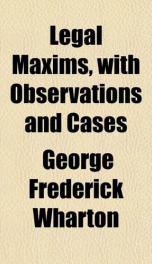legal maxims with observations and cases

Purchase of this book includes free trial access to www.million-books.com where you can read more than a million books for free. This is an OCR edition with typos. Excerpt from book: to be proved to enable, her executrix to sign judgment, but in consequence of a caveat entered by the defendant, probate was not obtained until tlie Gth May, 1852 ; the executrix having moved for leave to enter up judgment as of Michaelmas Term. 18,")1, it was refused, the delay not being attributable to any act of the court, though it. was admitted by the court to be a hard case. Also, where a judge's order was made a stay of proceedings on a day named, on payment of debt and costs, the plaintiff having liberty to sign judgment if the costs were not paid, and the plaintiff having died before the day named, it was held that judgment could not be entered mine //' fnne. Nor. even where the fault appeared to be that of the officer in the master's office, in delaying the judgment, it not appearing that the ofticer had refused to sign judgment. The principle governing the court in allowing judgment to be entered mine jru time, is upon the assumption that the party was in a condition, at the time as of which it is proposed the judgment should be entered, to claim thl decision of the court, the court not having jurisdiction otherwise to order judgment to be so entered. Amongst the cases where the error or delay is that of the court, and whereby loss and injury are occasioned to the parties, and in which, nevertheless, the court will not interfere to assist, are such as where, from want of proper arrangements as to time, causes are made remanets. or referred to arbitration, where some officer neglects his duty, where there is no appeal from the decision of the court or judge, and in many of those cases where the maxim. " omnia presumuntur rite esse acta," is said, though improperly, to apply. Jonk. Cent. IIS; 2 Wins. S;uind. 72; Miles c. Bough, !)Q.B. 47; Lawrence v. Hodgson, 1 Y. and ...
Info about the book
Author:
Series:
Unknown
ISBN:
1112000259
Rating:
4.5/5 (2)Your rating:
0/5
Languge:
English
Users who have this book
Users who want this book
What readers are saying
What do you think? Write your own comment on this book!
write a commentif you like legal maxims with observations and cases try:
Other books by this author
Do you want to read a book that interests you? It’s EASY!
Create an account and send a request for reading to other users on the Webpage of the book!

